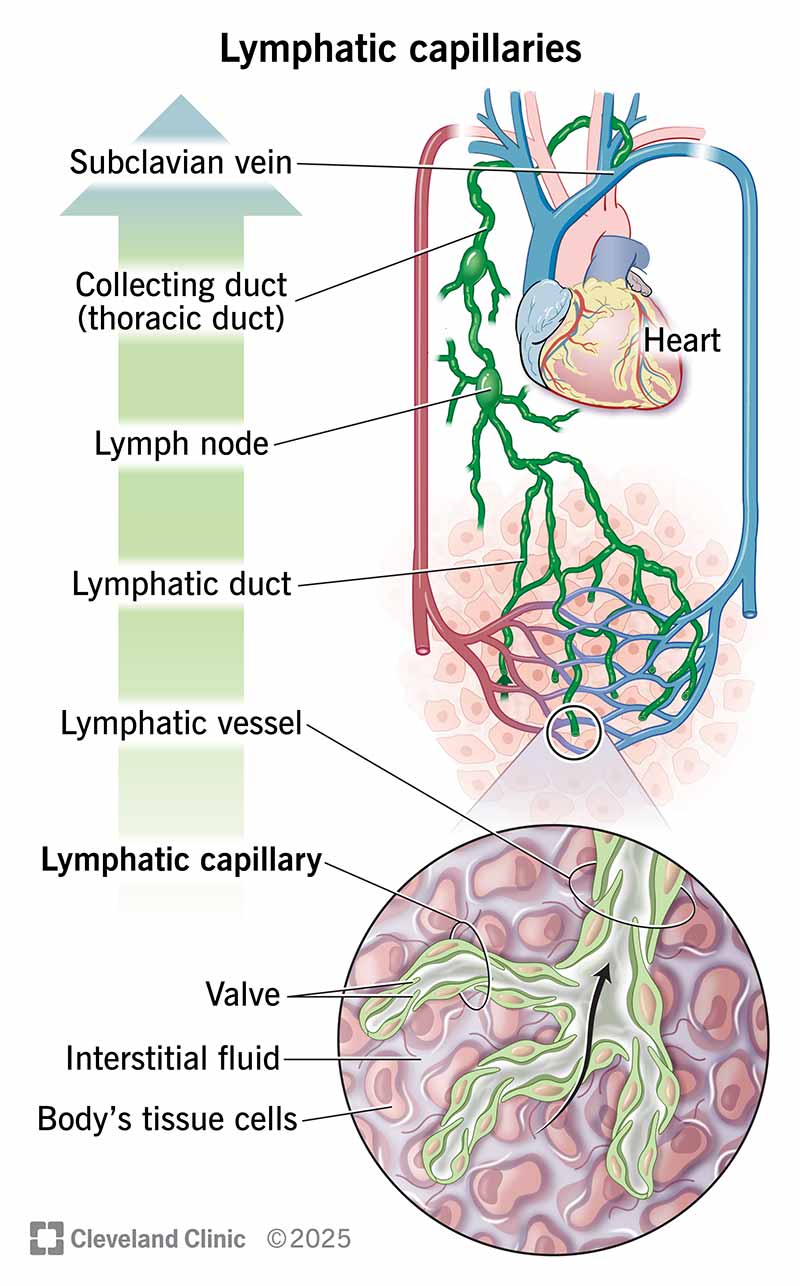Lymphatic capillaries are tiny vessels found in the tissues of most organs in your body. They transport and filter lymphatic fluid (lymph) from your body’s cells and tissues. Lymph capillaries help to keep consistent blood pressure and volume and prevent fluid buildup.
Advertisement
Cleveland Clinic is a non-profit academic medical center. Advertising on our site helps support our mission. We do not endorse non-Cleveland Clinic products or services. Policy

Image content: This image is available to view online.
View image online (https://my.clevelandclinic.org/-/scassets/images/org/health/articles/21897-lymphatic-capillaries-illustration)
Lymphatic capillaries, also called lymph capillaries, are tiny vessels throughout your body. They move lymphatic fluid (lymph) around and help keep it from building up. A capillary is a tiny tube with space inside as thin as a hair.
Advertisement
Cleveland Clinic is a non-profit academic medical center. Advertising on our site helps support our mission. We do not endorse non-Cleveland Clinic products or services. Policy
A lymphatic capillary is similar to a blood capillary. But lymphatic capillaries are larger in diameter (around) and have closed ends. Unlike with blood capillaries, fluid can flow into lymph capillaries but can’t flow out through the cell walls.
Lymphatic capillaries belong to your lymphatic system, which is part of your immune system. Your lymphatic system includes vessels, tissues and organs to collect extra fluid from nearly every organ in your body.
The function of your lymph capillaries is to help maintain your body’s overall fluid balance. All around your body, interstitial fluid (fluid found in the spaces around cells) leaks from blood capillaries into your tissues. Lymphatic capillaries pick up this extra interstitial fluid (lymph) that drains from your body’s cells and tissues.
Lymphatic capillaries help return lymph to your circulatory system. By returning this lymph to your bloodstream, lymphatic capillaries help maintain normal blood pressure and volume. They also help prevent fluid from building up around tissues (edema).
Lymph capillaries have permeable (pass-through) walls that only work one way — to let fluid in. Pressure inside these capillaries grows as they collect interstitial fluid from tissues. This increasing pressure moves the lymph fluid forward toward your heart.
Advertisement
Throughout your body, your lymphatic capillaries collect lymph and move it into larger lymphatic vessels. Along the way, the lymph fluid passes through lymph nodes, which filter and clean the lymph. Eventually, your body discards the waste and returns the filtered lymph to your bloodstream to begin the cycle again.
Here’s how the rest of the cycle works:
Lymph capillaries are found between cells (in the interstitial space). These capillaries are in the tissues of every organ in your body, except for bone marrow and your body tissues without blood vessels. These include cartilage and the epithelial (outermost) layer of your skin.
A lymphatic capillary consists of:
Lymphatic capillaries are tubes that are about 50 micrometers around (like a human hair). One end of the tube is closed and has an oak leaf shape. Lymph capillaries have thin walls, only as thick as a single cell. The cells overlap each other so that interstitial fluid easily enters the capillaries.
Lymphatic capillaries are similar to veins in that lymph moves in one direction, like blood in veins. Also, they both have thin walls.
Conditions that affect the lymphatic capillaries include:
Advertisement
Symptoms of conditions that affect lymphatic capillaries may include:
Tests for checking your lymph capillaries’ health may include:
Treatments may include:
You can take care of your lymphatic capillaries in these ways:
It’s important to stay current with preventive care, including annual physical exams. That way, your healthcare provider can detect problems at an early stage.
Contact your provider if you experience symptoms including:
Advertisement
You may not think about lymphatic capillaries until you feel sick or have swelling in your body. Some conditions can affect lymphatic capillaries. But you can reduce your risk of these conditions by living a healthy lifestyle and seeing your healthcare provider regularly. If you think you have a condition that affects your lymph capillaries, contact your provider for prompt diagnosis and treatment.
Advertisement

Sign up for our Health Essentials emails for expert guidance on nutrition, fitness, sleep, skin care and more.
Learn more about the Health Library and our editorial process.
Cleveland Clinic’s health articles are based on evidence-backed information and review by medical professionals to ensure accuracy, reliability and up-to-date clinical standards.
Cleveland Clinic’s health articles are based on evidence-backed information and review by medical professionals to ensure accuracy, reliability and up-to-date clinical standards.
Cleveland Clinic’s primary care providers offer lifelong medical care. From sinus infections and high blood pressure to preventive screening, we’re here for you.
